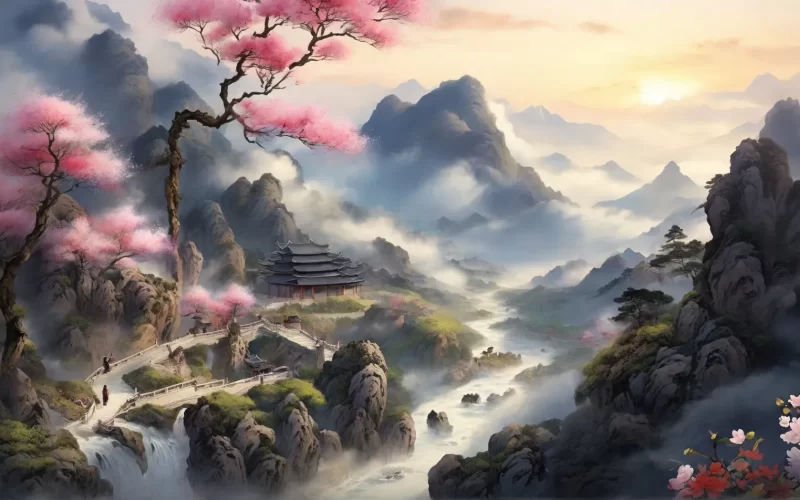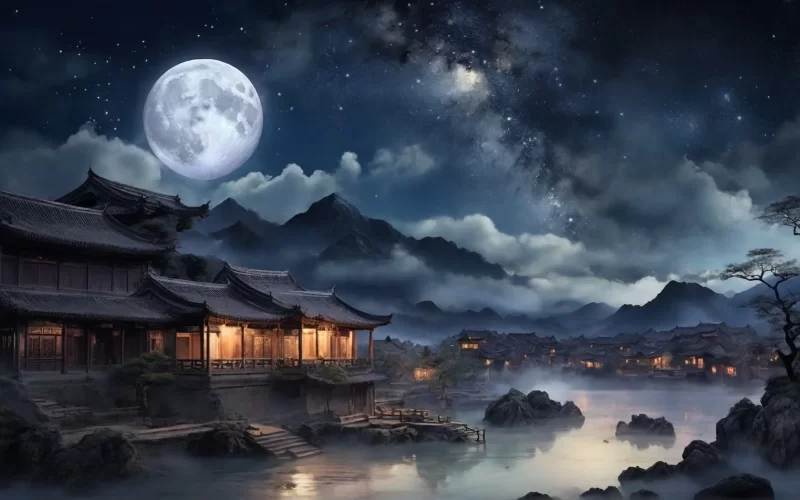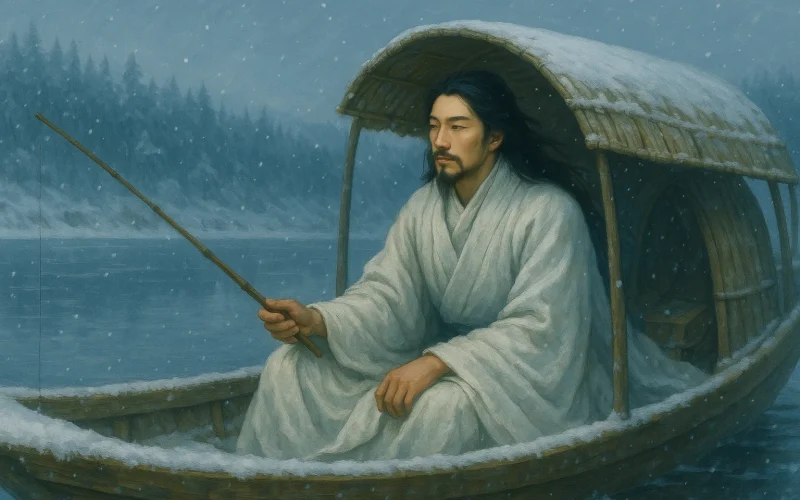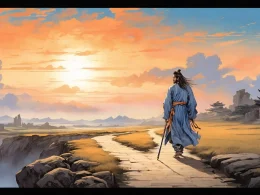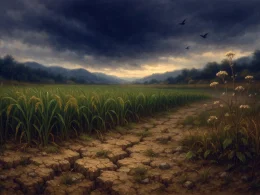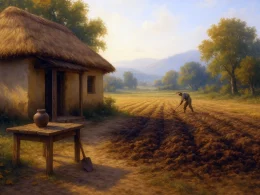On a road outreaching the white clouds,
By a spring outrunning the bluest river,
Petals come drifting on the wind
And the brook is sweet with them all the way.
My quiet gate is a mountain-trail,
And the willow-trees about my cottage
Sift on my sleeve, through the shadowy noon,
Distillations of the sun.
Original Poem
「阙题」
刘眘虚
道由白云尽,春与清溪长。
时有落花至,远随流水香。
闲门向山路,深柳读书堂。
幽映每白日,清辉照衣裳。
Interpretation
Composed during the High Tang period, this poem's original title was lost during transmission (hence labeled "阙题" - "Lost Title"). Scholars speculate it may have been titled "Returning to Taoyuan Village," referring to Taoyuan Mountain in present-day Jiangxi, where the poet Liu Shenxu lived in seclusion. The verses depict the landscapes and introspective tranquility of his reclusive life, embodying the refined elegance of scholarly withdrawal and a mind transcending worldly concerns.
First Couplet: "道由白云尽,春与清溪长。"
Dào yóu báiyún jìn, chūn yǔ qīng xī cháng.
The path ends where white clouds dissolve; Spring lingers with the clear stream's resolve.
The poet begins with a panoramic view, crafting an image where mountain trails vanish into clouds, and spring's vitality flows endlessly along the stream. "Ends" (尽) suggests not termination but an illusion of boundaries amidst misty peaks, while "lingers" (长) personifies spring as an eternal companion to the water—both embodying the timeless rhythm of nature.
Second Couplet: "时有落花至,远随流水香。"
Shí yǒu luòhuā zhì, yuǎn suí liúshuǐ xiāng.
Petals drift downstream at intervals; Their fragrance trails the liquid travels.
Here, spring becomes tangible: fallen blossoms ride the current, their scent woven into the water's journey. The verbs "drift" (至) and "trail" (随) animate the petals as conscious guests, subtly mirroring the poet's harmonious integration into this secluded world. The imagery merges movement and fragrance, celebrating life's quiet persistence.
Third Couplet: "闲门向山路,深柳读书堂。"
Xián mén xiàng shānlù, shēn liǔ dúshū táng.
A gate opens idle to mountain tracks; Amid deep willows, a study looks back.
The focus shifts to human habitation. "Idle gate" (闲门) reflects undisturbed solitude, while "deep willows" veil the scholarly retreat—a metaphor for the poet's dual commitment to hermitage and intellectual cultivation. The personified study "looking back" hints at introspection, as if the space itself contemplates its owner's meditative life.
Fourth Couplet: "幽映每白日,清辉照衣裳。"
Yōu yìng měi báirì, qīng huī zhào yīshang.
Even at noon, dappled light cascades; Cool radiance robes him in forest shades.
The finale captures the play of light: sunbeams filtered through foliage cloak the poet in "cool radiance." "Dappled" (幽映) and "radiance" (清辉) juxtapose shadow and illumination, mirroring the interplay between seclusion and enlightenment. This luminous tranquility becomes the ultimate expression of a life harmonized with nature's wisdom.
Holistic Appreciation
Comprising six lines with exquisite craftsmanship, the poem unfolds progressively: the opening depicts mountain paths and spring streams, establishing a serene natural setting; the middle section animates the mountain springscape with drifting blossoms and flowing water; then shifts focus to hermit life through gates, willows, and study halls, embodying quiet simplicity. The concluding couplet seals the atmosphere with "clear light gracing robes," revealing both the dwelling's seclusion and the mind's tranquility. Though never explicitly stating ideals or emotions, both resonate profoundly within its far-reaching意境 (artistic conception) and layered meaning.
Artistic Merits
The poem excels in parallelism and blending tangible with abstract, using plain yet profound language. Movement and stillness interplay, density and openness alternate, with scenes embedding emotion and emotion conveying aspiration. Its diction—terse yet vivid—paints striking imagery: "falling blossoms," "flowing water," "secluded glow," and "clear radiance" serve both literal and symbolic purposes. Particularly, the play of light and shadow immerses readers in the mountain grove, evoking whispering breezes, murmuring streams, and undisturbed peace.
Insights
This poem portrays a reclusive life detached from worldly chaos, returning to nature's purity—a cultural ideal of "farming-and-study heritage" and "communing with landscapes" cherished by Chinese literati. Beyond natural beauty, it reflects mental clarity and life's self-sufficiency. For modern readers, such an attitude of leisure, serenity, and symbiosis with nature offers invaluable spiritual enlightenment, worthy of contemplation and pursuit.
Poem translator
Kiang Kanghu
About the poet
Liu Shen-xu (刘眘虚), whose date of birth and death are unknown, was a native of Fengxin, Jiangxi Province. He was one of the "Four Friends of Wuzhong", together with He Zhizhang, Bao Rong and Zhang Xu. In 723 AD, he was admitted as a jinshi. He was fond of traveling with mountain monks and Taoist priests, but he lived in exile and did not live long. His poetic style was quite close to that of Meng Haoran.






